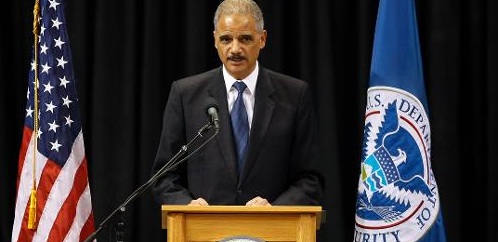Attorney General Holder
[Speaking Truth To Power]
Voter Disenfranchisement and the Criminalization of Blacks For Profit
This week, Attorney General Eric Holder argued that ex-felons, who’ve already served their time, should be allowed to exercise the democratic right to vote. For decades, many ex-felons, a large percentage of them being African-Americans, have been disqualified from voting as part of their punishment for the offense they were convicted of.
But we should consider these questions: is it truly a democratic principle to disenfranchise citizens of their voting rights because they have been convicted of a crime? And doesn’t this practice represent a small fraction of the attempts, by America’s justice system, to criminalize African-Americans and stifle Black political participation and self-determination—while rationalizing the naked racism many articulate against African-Americans with regularity?
On Tuesday, speaking at Georgetown Law Center Mr. Holder said, “It is time to fundamentally reconsider laws that permanently disenfranchise people who are no longer under federal or state supervision.” Mr. Holder’s comments highlighted the disproportionate effect these laws have on African-Americans. Currently, an estimated 5.8 million people are prohibited from voting due to felony convictions—38 percent of them are Black.
And, although African-Americans only represent around 13 percent of America’s population they account for approximately half of the nation’s 2 million prisoners. Mr. Holder pointed out that in the post-Reconstruction period southern states started using felony laws to disallow Blacks from voting. The attorney general made the case that permanently disenfranchising ex-felons makes it extremely difficult for them to reintegrate into society.
“These restrictions are not only unnecessary and unjust, they are also counter-productive,” Mr. Holder said. By perpetuating the stigma and isolation imposed on formerly incarcerated individuals, these laws increase the likelihood they will commit future crimes.” Mr. Holder highlighted a Florida study showing former felons there that had their voting rights reestablished had lower rates of recidivism.
Several places in the world allow ex-felons to vote—and in Vermont and Maine inmates are also allowed to vote.
Unfortunately, the system of prison “corrections,” in America, does very little to correct the behaviors of most who have been convicted of a crime. And we should ask if it was really ever meant to achieve that objective to begin with. Attorney General Holder’s comments tangentially touches on ugly truths of the American penal system that need to be fully fleshed out.
In a supposed democratic country is it justifiable to rescind the right to vote because a person was deemed guilty of an unlawful offense? Even more importantly, what is the real role of prisons and incarceration in America, especially, with respect to African-Americans—when ex-offenders are denied certain rights for the rest of their life even after release? How are ex-offenders to become “contributing members of society” if past convictions, including usually of a non-violent nature—are continually held against them, which then, prevent them from being able to obtain jobs, housing, and other services.
Mr. Holder is correct, when he says denying the vote to ex-offenders creates problems and “the likelihood they will commit future crimes.” Moreover, if someone has already served their time, aren’t these measures unjustly punitive? But isn’t it now quite clear these political policies intend for that outcome to be the case, when prisons are currently considered a “growth industry,” where prison corporations are now listed on Wall Street?
Prison privatization, and for profit prisons, are making some people very rich. One example is the Wackenhut Corporation, also called the GEO Group—one of the largest private prison companies in the world—which is listed on the New York Stock Exchange. Wackenhut is responsible for upwards of 24,000 prisoners. And prison privateers like Wackenhut and CCA (Corrections Corporation of America) are allowed to use their blood money to wine and dine politicians with the intent of influencing them into maintaining harsh “law and order” policies designed to keep prisons bulging and profitable—especially, at the expense of Black lives.
Prisons produce many manufactured items including: airplane parts, medical supplies, office furniture, home supplies, paint supplies, home appliances, audio equipment and military goods, among other things. And many other corporations are allegedly investing in this “booming” industry of incarceration including: IBM, Boeing, Motorola, Microsoft, AT&T, Wireless, Texas Instrument, Dell, Compaq, Honeywell, Hewlett-Packard, Nortel, Lucent Technologies, 3Com, Intel, Northern Telecom, TWA, Nordstrom’s, Revlon, Macy’s, Pierre Cardin, Target Stores, and others.
Because of this profit-driven motive, we now hear stories of judges and the like engaging in nefarious scandals, like the “cash for kids” scandal in Pennsylvania. In that case, former judges Mark Ciavarella and Michael Conahan were accused of taking bribes from Robert Mericle—a builder of for-profit juvenile centers to steers inmates to the facility. Both judges were eventually convicted of their crimes. Judge Ciavarella received 28 years and Judge Conahan received 17 years.
Obviously, the prison industry is seen as a viable economic resource for some in White America. Indeed, many White areas are now opening their arms to building prisons in their neighborhood—since Whites in those vicinities would have a source of employment which would increase the residual revenue in these regions. This is truly ironic given the fact most Whites, historically, chose to segregate themselves from living amongst Blacks. In effect, prisons are now the 21st Century plantation industry where Blacks are being warehoused on a massive scale.
Realistically, the first prisons Africans faced in coming to America were in the bellies of slave ships—like The Good Ship Jesus and Mother Mary—where we were packed in like sardines. From those prison slave ships, to prison plantations, to engineered legislative machinations to criminalize people, using “laws,” like the Black Codes, Vagrancy Laws and the Convict Lease System in the past to today’s “war on drugs,” the objective has always been the same: to exploit and victimize African-Americans and criminalize them to justify a barbaric, bigoted and now profitable behavior against Black people.
Even mainstream media demonization and mythology perpetuate the supposed “genetically-predisposed” criminality of African-Americans. Many in positions of power pretend away the history of genocidal acts that annihilated millions of Indigenous Americans and the modern day continuation of that tradition through corporate-driven war-mongering, and political policies that only enrich the few.
Yet Blacks are predicate criminals?
America’s criminal justice system is clearly and fundamentally racist to the absolute core. In all aspects of the system, racial disparities abound. African-Americans get higher sentences across the board for many “crimes,” and, on Death Row, are over- represented.
The so-called “War on Drugs” is nothing more than a manifestation and continuation of the institutional racism that has evolved since Slavery. The criminalization of African-Americans has always been about thwarting the political progress of Black people. For this reason, we must question and target the real purpose of prisons as they currently exist.
Moreover, the prejudice within America’s prison industrial complex must be exposed within the national and world arenas.
Eric Holder’s speech contributes towards that long process.


















